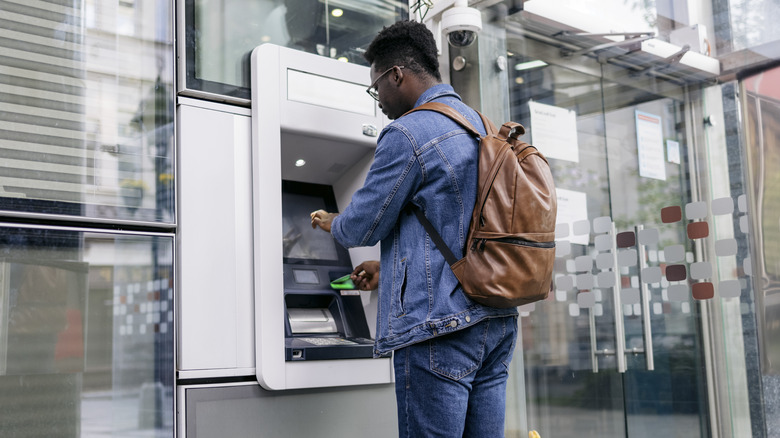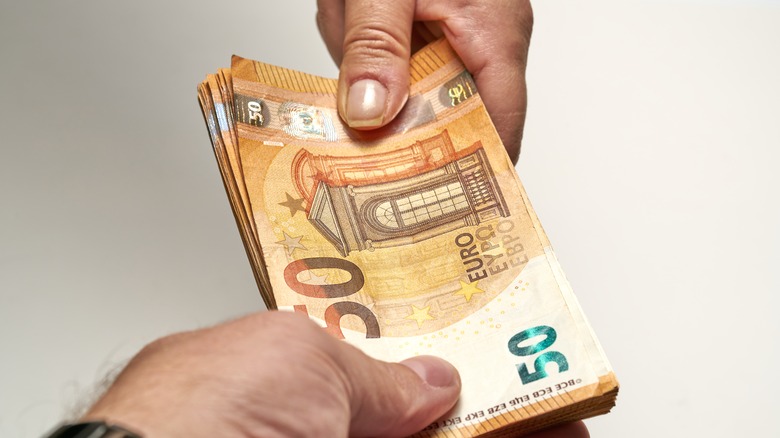The Costly Mistake To Avoid When Using An ATM Abroad
You should always carry some cash when traveling abroad. However, almost every traveler has made this mistake at least once when they withdraw cash from an ATM. When you go to withdraw your money from a foreign ATM, you'll most likely be faced with a question about whether or not you accept the offered exchange rate. Dynamic Currency Conversion (DCC) is what determines the exchange rate at ATMs. DCC is also used at shops and restaurants with point-of-sale (POS) devices, where you might be asked if you want to be charged in local currency or your home currency.
Most people click accept since, in many cases, the ATM or POS systems will make this exchange rate sound like a good deal. It will also show you what you owe or are withdrawing in your home currency upfront rather than waiting to see it show up on your bank or credit card statement. What most travelers don't realize is that your bank or credit card will, in most cases, actually have a better exchange rate. Additionally, with DCC, you may be charged further hidden fees on top of the worse exchange rate, including foreign transaction fees. So, when asked this question, click decline or do not accept. When you do this, the ATM will use your bank's conversion rate. However, there's also a better way than just trusting the whims of either the local ATM network or even your own bank.
Where you can exchange your money without hidden fees
If you don't want to deal with withdrawing cash at an ATM, the next best thing you can do is order currency from your bank before leaving home. Banks in the U.S. can order most global currencies to be delivered within a few business days and at a more favorable exchange rate than an ATM or at a money exchange counter at your destination.
With exchange rates fluctuating daily, you can lock in a rate by ordering currency in advance and have it on hand as soon as you touch down. This eliminates the need to deal with ATMs or exchange counters after many hours or days of travel. You may feel anxious carrying around so much cash, but as long as you keep it in a safe place inside your backpack or carry-on, you'll be fine. If you're asked to gate-check your carry-on bag, keep the cash on you along with your other valuables.
Something else you can do if you don't want to deal with ordering money at home is just to exchange money at a local bank. It's a good idea to carry home currency with you anyways for emergencies; local banks at your destination may offer you a similar rate and, in some cases, not charge any fees at all. Your experience will vary widely with this depending on which country you're in and whom you're dealing with at the counter.
Use travel-friendly credit cards where possible
Regardless of whether or not you pick up currency before you leave or exchange it at your destination, it is always a good idea to check if your credit cards charge foreign transaction fees. Because unless you're going to a country where using credit cards is uncommon, you're almost guaranteed to use them at least once. There's nothing worse than coming home to a slew of foreign transaction fees on your purchases and realizing you could have had a really nice dinner with that money instead of handing it over to your credit card company or bank.
According to research conducted by WalletHub, some of the best travel-friendly credit cards include the Bank of America Travel Rewards card; the Capital One SavorOne card; and the Discover it Miles card, which all currently have no foreign transaction fees and zero annual fees. The Chase Sapphire Preferred Card is another one with no foreign transaction fees, but the annual fee is currently $95. There are lots of other travel-friendly cards out there, too, so do your research to find which one is best for you.


